This post may contain affiliate links. Exploring new sights is a participant in the Amazon Services LLC Associates Program. As an Amazon Associate, we earn from qualifying purchases linking to Amazon.com and affiliated links.
Living in an RV gives you the freedom of being able to take your home anywhere.
Knowing that you can change your own view from the beach one day to the mountains the next is exhilarating.
However, it is a completely different lifestyle than a stick and brick home or apartment.
Before jumping into living in an RV, there are some things that I wish I did more research on.
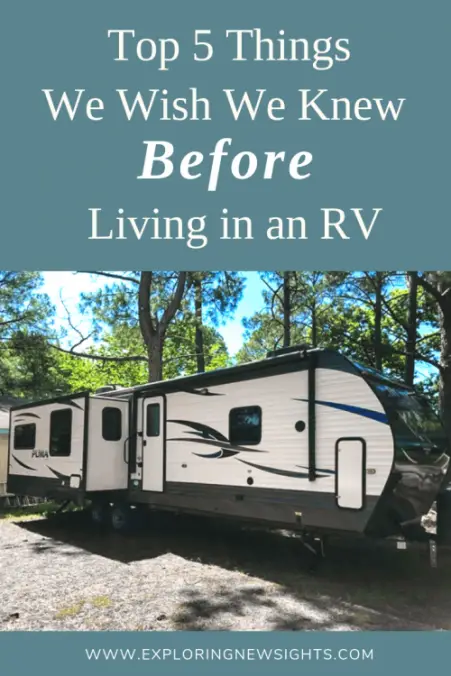
None would have changed my mind, but it is great information to know and consider. Information like RV parks, the plumbing situation, and additional preventative maintenance to seals and slideouts.
So let’s get into the 5 things we wish we knew before living full-time in an RV.
1. The Cost of RV Parks
Yes, while many think living in a tiny RV cuts down your expenses drastically from a house or rent payment, the reality it’s not much.
The lowest RV parks with the full hookups of water, 30/50amp (depending on what you need, ours is 50amps) and sewer are between $30-$50 a night. Do the math, $30 a night Times 30 days, that’s $900 a month. Not much less then a 1 bedroom apartment when you factor in the RV payment if you have a loan.
Now, there are options of “boondocking” and many RV parks can run discounts if you pay monthly and in advance.
There are also some great options to buy yearly packages that allow you to visit multiple parks in a certain region for a good price. Thousand Oaks Trails has some great options for yearly park packages.
2. The RV Age Limit
Now, we wanted to buy new due to personal reasons, however, it definitely is something we wish we knew. It would have helped when we were thinking of buying used and renovating.
Check out our post on Should you Buy a New or Used RV? Analyzing the Pros and Cons!
If you are looking to purchase used, please know many RV parks do not accept anything older than 10 years old.
Now, I have heard that some RV parks will make exceptions depending on the renovations and upkeep on RVs. That’s something you definitely want to look into though.
3. Grey and Black Tanks
I wish we would have known more about the grey and black tank situation.
Living in an RV is a totally different way of living. We learned about the sensors, dumping, and treatments basically on our own and googles help. It seems easy, for example, once the sensors indicate they are full, release them.
However, no one said the smell would fumigate the whole RV and after every dump, you have to put in treatments to help with the smell and break stuff down.
After a month of living Full-time, we found “Happy Camper” tank treatment. Seriously, this stuff is like GOLD to RV’ers. If you haven’t tried the “Happy Camper” tank treatment, it’s it 100% worth it and you will never buy another tank treatment again. You can get some on Amazon here.
Also, we didn’t realize the sensors would get dirty and pretty much never go back to notifying they were completely empty.
4. RV Suburban Hot Water Heaters
Never in my life did I even consider flushing/cleaning out a hot water heater.
We quickly realized when our hot water started to smell like rotten eggs. Ewwww gross! However, it’s common and happens when the water is high in natural minerals.
Now, there are two types of hot water heaters that are used in RVs, Suburban, and Atwood.
Ours happens to be a suburban that requires a metal rod to absorb the bad bacteria when water gets hot. Once the anode rod is deteriorated it needs to be changed. If not changed then the tank can corrode from bacteria.
We flush our hot water tank about once a month because we run off well water and the minerals accumulate in the bottom of the hot water tank. We only replace the anode rod once it’s completely deteriorated.
Update: Replace your Magnesium Anode Rod with an Aluminum Anode rod to get rid of the Sulfur Rotten Egg smell in your RV hot water tank.
5. Window and Roof Seals
Now, we bought our RV brand new, straight off the lot 2019. We had the idea, “it’s brand new, we shouldn’t have to worry about anything for a while”…. wrong!
We learned quickly when I woke up to go to work, it was raining not only outside but also through one of the slide windows. Water was just pouring in that we barely could keep up with the towels.
It was not fun, but with a shop vac, fans, and more towels it ended up being okay.
We bought an all-weather sealant to seal it up on the outside because there was no way we could get it to a shop. When you live fulltime in an RV, something’s as simple as sealing a window is easier just done on your own.
Now, we check our windows and roof after rain and at least every 60-90 days.
Final Thoughts
There are many other things we wish we knew but these are definitely the top 5. Now, I know some of these things seem like things we should have known. However, we didn’t because it was something so new to us and that’s okay.
We learned as we went, after all, we just changed our complete lifestyle. We both grew up in sturdy homes, where you didn’t worry about where to dump your dirty water or having to clean out your water heater.
I hope this article brings light to anyone considering purchasing their first Rv, whether it’s living fulltime or just something for the weekends. It’s an amazing journey!
Tell us about what you wish you knew before buying an RV or living in one. Comment below! Sharing is Caring! Help others get an Idea of what it’s like to live in an RV. Tweet, Pin, Share!!
PIN TO SAVE FOR LATER!!

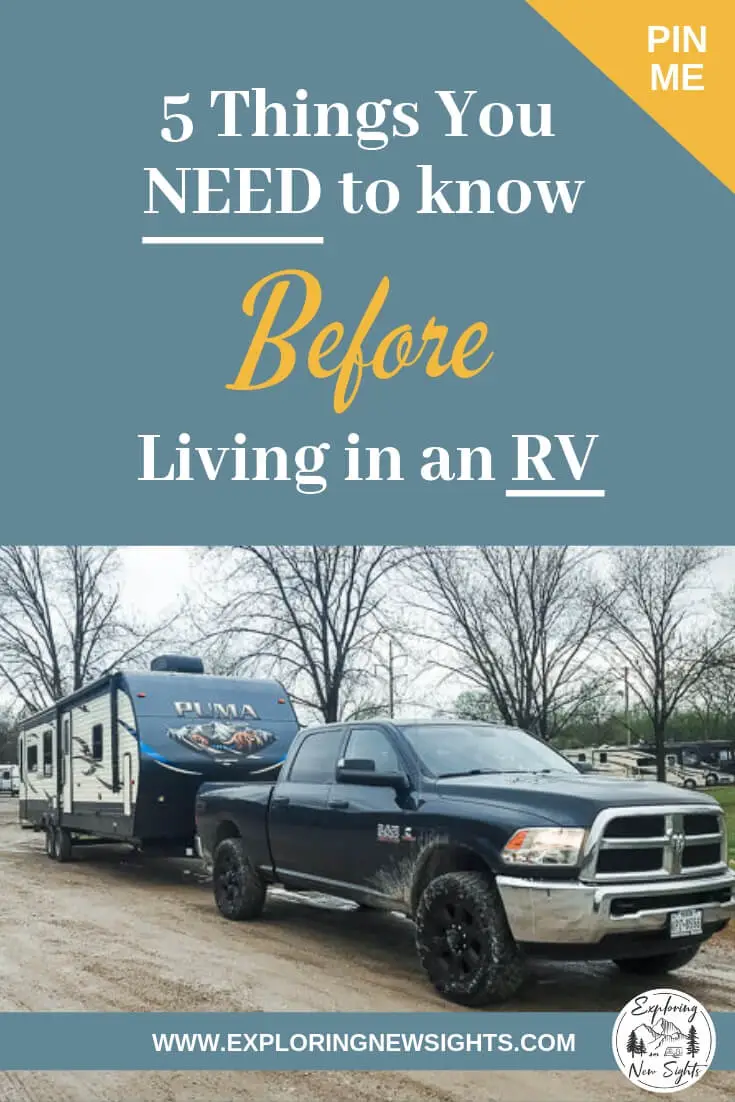
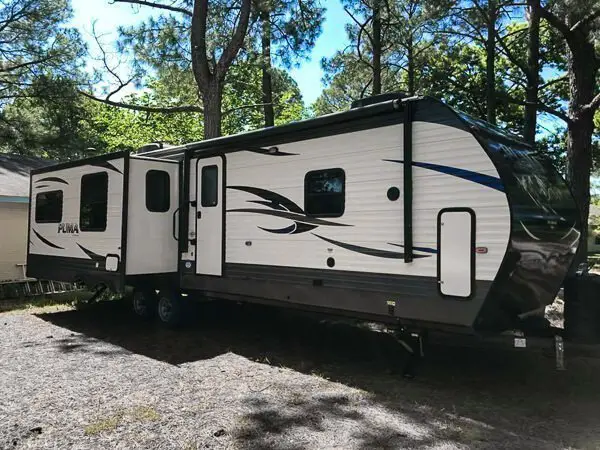
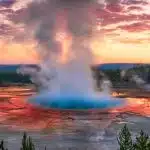
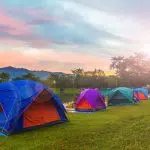

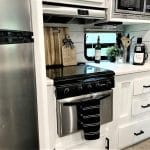





What did you use to seal up your windows and have you ever had to patch the roof? If so what did you use for that?
Hi Anitra, we used a self-leveling RV sealant I purchased on Amazon. I haven’t had to repair any of the roof, but it worked great for the window.
Hi Nissa,
I am about to hit the road a start my RV semi-full time. There are many blogs, videos, and other RV Essential resources it can make one head spin. Yours is very good.
The one area that virtually no one talk about is using a bidet attachment to the toilet. I have used bidets at home and virtually eliminated the need for any toilet paper. Bidets are superior in providing a hygienic clean and reduce a major blackwater tank issue: Toilet Paper clogs. Worth looking into for your next blog.
That is an option, for sure! Bidets aren’t really popular, but I can see how fantastic they would be in an RV. Thanks for the idea! Happy RVing!
Thanks my husband and I are dreaming of being full time RVers. In the next year or two. Looking at RVS now more and working on down sizing at home. Thanks for the blog. Only had a popup camper and tent. So this is helping a lot.
Hey guys!
Just stumbled upon, and read, your blog and wanted to congratulate you on your leap to living the RV life! We started our journey about three years ago, living in it stationary for about 10mos to get our ducks in a row basically and then hitting the road and never looking back! It has been everything and more than we could have ever imagined back then! But reading your blog refreshed so many memories from those begginings, which is such a precious time!
We are very excited for you and wish you all the best! I’ll be sure to keep up with your blog so we can keep up with your adventure 🙂 We’re actually wintering this year in your home state of Texas! Feel free to reach out to us if there’s ever a way we can be of any help! We’re all just one big happy family out here 🙂
Hi, Craig and Nicole! Thank you so much for sharing. This is so encouraging! I can’t wait until we are able to actually hit the road. I hope you enjoy Texas 🙂 We are happy to be apart of big happy rving family. >>PS: If you ever would like to do a guest blog post, please let us know!
Something’s we wish we knew. 1. Price is at the top of my list as well. 2. Every time one person moves in the trailer the entire trailer shakes. Its the worst at night. 3. In cold weather moisture builds up in the storage area of the slideouts and all our items had to be trashed due to mildew. 4. Older campgrounds have difficulty keeping up with the electricity demand and they did not upgrade. we would be without electric and no heat. 5. Four people can not shower all in a row and have hot water. The last person always got a cold shower. We sold the trailer and baught a house.
Those are some great points! The RV life isn’t for everyone! 🙂
Thank you for this article, my family of 6 is plan on purchasing our first travel trailer also wanting to purchase new so we don’t have as many issues, however I didn’t realize some parks cost so much so I’ll be do math of the cost of the pick up truck and trailer and park. I want to make it make sense before we jump into the lifestyle. I’m excited either way to show our kids mountains and forest and oceans lakes and rivers is my type of life.
Hi Gabriella! I’m so glad you found this article helpful! It is a full lifestyle change and unless you plan on Boondocking, the RV sites with full hookups can get expensive. I wish you all the best on your adventure! I am sure your kids will enjoy every bit of travel and adventures. I always say “Where there is a will, there is a way!”